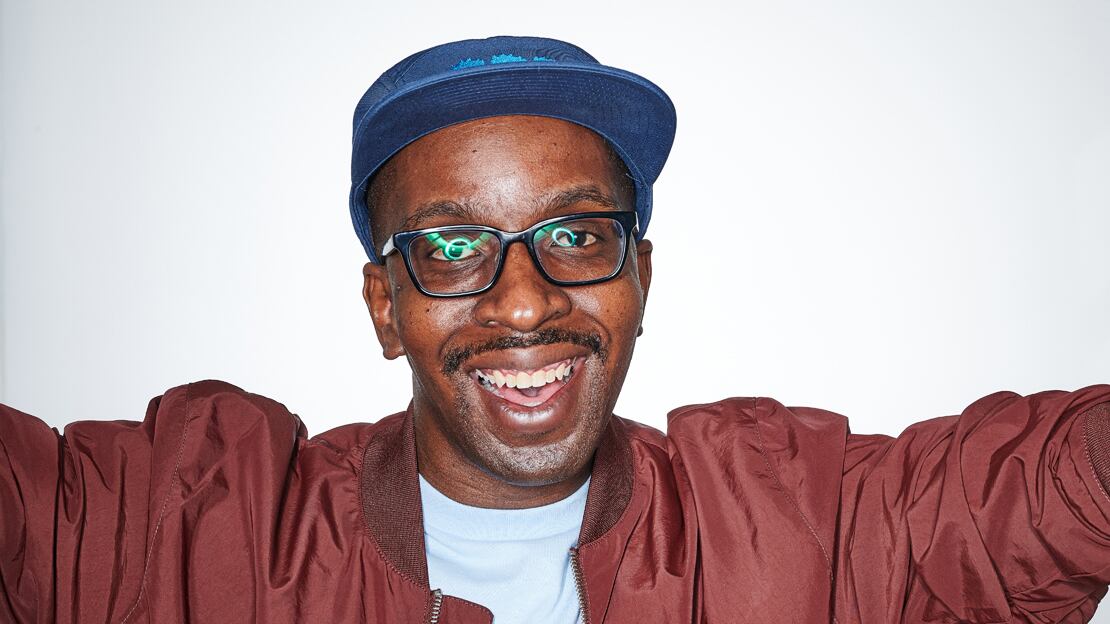Jaren George has a joke about how white Portlanders keep calling him “a beautiful Black man.” These strangers are well-meaning, he infers, but in an unsettling, micro-aggressive, I-noticed-you’re-Black kind of way.
The bit mostly generates knowing laughs at shows, a standout in George’s act that regularly touches on being a Black comedian in a largely white city and comedy scene. And it fits in easily around self-aware material about his slight build (stop offering him granola bars) and sounding like the only Black kid at a Jewish summer camp (George’s New York accent remains.)
But then there’s that portion of the audience that likes his “beautiful Black man” joke but doesn’t fully get it. They’re the ones who come up after shows and reiterate that he’s “a beautiful Black man” or grab his arm to tell him they’re “so proud.”
“Do they mean it? I don’t know,” George says. “Actions show me otherwise! But they’re smiling at me. So it’s a lot. The point [of that joke] was that you don’t have to do it.”
If the irony is lost on some, maybe it’s George’s exuberant, endearing stage presence that dupes them. Even sarcasm comes off as a little bubbly from George, who took up comedy shortly after moving to Portland in 2013. After all, he maintains a very earnest core mission behind his standup.
“I really want to cheer people up,” he says. “Comedy! I’m here. Let’s do it.”
Case in point, one of George’s earliest memories of joke-cracking occurred when visiting an aunt in Deltona, Fla., at age 8. When his aunt’s ex-boyfriend turned up drunk in the night and started smashing up the kitchen, young Jaren engaged in a silent round of the board game Trouble with his mom and cousin, trying to remain unnoticed in the bedroom. They had no problems staying quiet until George cracked up the group.
“I wanted to break the tension,” he remembers. “You just keep hearing the bobble, the little [Pop-O-Matic]. I remember just saying, ‘Good thing we’re playing this game. We are in trouble.’”
Comedy as a universal pick-me-up is reflected in George’s OPTIMISM! Comedy Showcase, which he hosts monthly. It’s named after a decade-old New York City MetroCard still stuck on George’s electric guitar (right next to a decal from George’s favorite band, The Thermals). The 35-year-old comic can’t remember why the NYC subway was branding its cards with random messages of positivity, but the idea “stuck” with him.
“Maybe 1 in 10 [riders] were depressed at the time,” he laughs.
As much as George savors making comics and patrons feel welcome while hosting showcases, he’s also willing to share and even exit the spotlight on his weekly improv podcast The IT Desk, which launched last March. Inspired by his day job in tech support and customer interactions that sometimes verged on emotional breakdowns, the podcast’s premise is always the same.
Two comics, often from the Pacific Northwest, improvise on a blind Zoom call, one playing the IT expert, the other a disgruntled customer. In the episode’s second half, George joins them for a debrief, and the comics guess each other’s identity. George compares the show to a mix of Crank Yankers and Comedy Bang! Bang!, but with a precise hook.
In addition to lampooning customer service nightmares, the podcast offers George and his guests a forum to hone their hosting chops and improv, respectively. Ultimately, refining a craft was the reason George picked up comedy in the first place nine years ago, long before he became a scene stalwart, toured the East Coast and landed a background role on Shrill.
“When I started doing comedy, I wanted to get better at public speaking,” he says.
A self-admitted overtalker as a kid, George has worked to pare down his act from early narrative rambles, maximizing his jokes-per-minute rate. He’s looked up to Portland standup luminaries like Amy Miller and Baron Vaughn through the years, cutting the fat from his sets to reach their absolute essentials. Kind of like George’s favorite candy, Kit Kat, which seems to continue breaking off into his routines.
In one opener, George compares himself to a single Kit Kat stick. In another, he dispenses Kit Kats to the audience at an Oprah-esque volume, only to take them back for his dinner. (Once or twice, they’ve been eaten by the second half of that gag.) There’s a kinship between George’s act and his candy—or prop—of choice. Simple recipe. Big crunch, no fuss.
“I don’t like Skittles or fruit candies; I despise mint chocolate,” he says. “The Kit Kat is basic. Let’s get down to it.”
